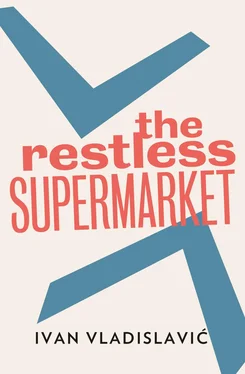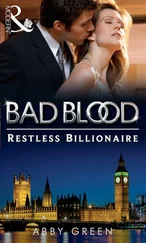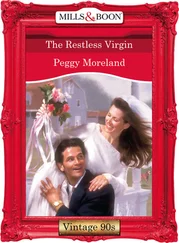I introduced Mr Fatso/Mnr Vetsak to his brethren in my notebook — he fitted in between Mr Video and Mr Meat — and went on with my own work. Fortunately, I had finished my composition, in the requisite brief paragraphs, and was busy inking up a fair copy (which I would typewrite later that evening at home), and so I was able to put Wessels from my mind and concentrate on my penmanship.
When I had finished, I laid my notebook down on the table. The sight of a pen in Wessels’s freckled fist in place of a reeking cigarette was compelling. But it was so obviously a ruse to implicate me in his plans for the Goodbye Bash — as I was determined to call it — that I resolved to make no comment. Soon he put down his pad too. He swizzled his brandy with his pen, then clipped it in the flap of his right ear.
No sign of Moçes. Perhaps he was out on the balcony, behind the venetian blinds, where Errol and Co were cackling and hooting. Probably sharing an illicit cocktail laced with amphetamines. Discipline among the waiters had broken down entirely under the influence of these hooligans.
‘What you got there?’
‘A letter to the editor of the Star about an unnerving experience I had yesterday, which I wanted to get off my chest.’
‘We haven’t had one of those for donkey’s years-ss. Can I see?’
The man was a fount of amphibology. It was Café etiquette, in the old days, never to ask to read my communications until they were printed in the newspaper. Wessels’s flouting of the rules, to which I had long thought myself inured, coupled now with his persistent invocation of the past, irritated me all over again. But having watched his version of writing, I was intrigued to see him reading as well, so I handed him the notebook, which he bore up towards his face at once like a toasted sandwich, as if he meant to take a bite out of it. As I expected: the thick lips moved to frame each word. Personally, I prefer reading silently, to myself. Reading belongs in the head, behind the eyes, not just under the breath, but inside the folds of the brain. I can tolerate reading out loud on occasion, if the words are enunciated clearly and the circumstances are fit. But this soundless movement of the lips is uncouth, like a cat twitching through a rutting dream.
7 December 1993
Dear Sir,
In a lifetime of accident-free motoring, I have been the owner of half a dozen passenger vehicles, including several purchased out of the box, but as a pensioner I am now reduced to travelling either by bus, an ordeal since the municipal prohibition on smoking is no longer enforced, or by shank’s pony, ever the most reliable means of private transport, despite the hazards posed by ‘muggers’, excavations, hawkers, uneven paving-stones and reckless drivers.
Yesterday afternoon, I was crossing Abel Road in Hillbrow at the Catherine Street intersection when a delivery van in the service of the Atlas Bakery tore through a red robot and very nearly knocked me down.
As the rear bumper of the vehicle flashed before my eyes, I saw affixed to it a sign that read: ‘How am I driving?’ One might have assumed that the question was merely rhetorical. However, the telephone number appended made it clear that an answer was sought. I have a head for figures, thanks to my professional background, and so I was quick to memorize this number, along with the registration number, and several other details.
Immediately after the incident, I transcribed these details into the notebook I was carrying, and am enclosing a photostatic copy of the relevant page. The man in the street is not expected to have pen and paper to hand nowadays, I know, but then I have never resembled that mythical creature.
This morning, I dialled the telephone number of the Atlas Bakery and was put through to a Miss Papenfus, a superficially polite but intrinsically ineffectual young woman, who showed no interest whatsoever in the nimble undertones of her ostensibly flat-footed name.
Explaining the purpose of my call, I provided the registration number of the van and asked to speak to the driver concerned, but this request was refused. I was urged instead to address my complaint to the Director of Human Resources in writing, an offer I flatly rejected as being likely to end with my statement ‘put on file’ and duly forgotten. In any event, I am not a human resource, I am a member of the public, and I did not have a complaint, but an answer to a question.
Having failed to make a verbal report, an affidavit in the true sense of the word, I am now ‘going public’ through the channels of your newspaper.
‘How am I driving?’ You are driving atrociously. You are a menace on the road. A more urgent question might well be: ‘Why am I driving?’ And an honest answer should persuade you to seek a form of employment more suited to your temperament.
Yours faithfully,
A. Tearle
(Proofreader, retired)
Not one of my best, but adequate for a man who was out of practice.
Wessels, true to character, remarked on none of its qualities. After an elaborate show of thinking, which brought to mind the ‘cog’ in ‘cogitation’, he said: ‘You checked all these facts and figures with those binoculars of yours? This ou must of been doing five miles an hour.’
‘Bifocals, kilometres,’ I said, leaving aside the finer points of grammar and usage for the time being. ‘My eyesight is every bit as acute as your own.’
And I demonstrated by reading the signs that said ‘Ladies’ and ‘Gentlemen’ on the lavatory doors (facetiously, of course, I have absolutely nothing to prove to Wessels). That ‘Gentlemen’ in particular has always touched me. I stood up for it too, when its existence was threatened by the New Management’s ethnic expedients ‘Amadoda’ and ‘Abafazi’. Not that too many of the individuals, both scruffy and overly groomed, who crossed that threshold deserved the compliment, but it was the thought that counted. ‘Gentlemen’ was so much more encouraging than the ‘Gents’ one encountered everywhere else. Or the cute couplings of Adams and Eves, Jacks and Jills, Romeos and Juliets, Bonnies and Clydes, Guys and Dolls, Mickies and Minnies, and even, confusingly, Nuts and Bolts ( vide ‘nomenclature, cloakrooms’ in the notebooks). Frequently illustrated with tailcoats and crinolines and other outward signs, increasingly archaic, of the distinctions between the sexes.
‘Who’s this guy Shanks, with the pony?’
‘Old friend. Went to different schools together.’
‘Didn’t they teach you to write short and sweet? What’s-his-face will cut this in half, if he gives it out at all.’
Unfortunately, he was right. This letter has been shortened — Ed. The letters editor was someone of the Wessels type, at home among the Gavs and Erns. He’d delete the half he didn’t understand. Wouldn’t even bother to use a pen: just hit a button and make it vanish.
‘And what’s the use of talking to the driver? He probably doesn’t read the Star . Probably can’t read!’
‘Thanks for the constructive criticism.’ I took back my notebook. Mr Fatso/Mnr Vetsak puffed out his chest. Wessels wanted me to ask about his own literary efforts. I hid behind my newspaper.
‘What you suppose I got here?’
‘Invitation list. For the Goodbye Bash.’
‘Reunion.’
‘Have it your way.’
‘You wanna see it?’ And without waiting for a response, he shoved the pad under the bottom of my newspaper. I might have brushed it aside, but for the morbid fascination of Wessels’s drunken handwriting. Across that grey parade-ground of paper staggered mutinous ranks of tipsy letters, incapable of standing up straight without the support of their neighbours, struggling vainly to keep their feet on the lines. Half a dozen had fallen flat on their faces, one or two had wobbled right off the page. The only upright character was the very first capital M, rooted to the spot by the blue ink-blot, like a plaster cast, in which its right leg was encased.
Читать дальше












